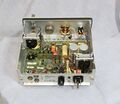1382: Difference between revisions
Jump to navigation
Jump to search
No edit summary |
No edit summary |
||
| Line 16: | Line 16: | ||
The {{Title|General Radio 1382 Random-Noise Generator}} was introduced in {{Catalog T}} and remained available through {{Catalog 1978}}. | The {{Title|General Radio 1382 Random-Noise Generator}} was introduced in {{Catalog T}} and remained available through {{Catalog 1978}}. | ||
The Type 1382 is a solid state device that produces electrical noise in the audio frequency range. Three spectrums of noise are available | The Type 1382 is a solid-state device that produces electrical noise in the audio frequency range. | ||
Three spectrums of noise are available, selected by a front panel switch. Outputs are provided on the front and rear panel, grounded or floating. | |||
The 1382 is useful for audio amplifier testing, frequency response measurements, and acoustical testing. | |||
==Specifications== | ==Specifications== | ||
Revision as of 07:40, 12 April 2024
The General Radio 1382 Random-Noise Generator was introduced in Catalog T (1968) and remained available through Catalog 1978.
The Type 1382 is a solid-state device that produces electrical noise in the audio frequency range.
Three spectrums of noise are available, selected by a front panel switch. Outputs are provided on the front and rear panel, grounded or floating.
The 1382 is useful for audio amplifier testing, frequency response measurements, and acoustical testing.
Specifications
- Spectrum: white, pink, or ANSI spectra
- Output Voltage: > 3 V rms max, open-circuit, for any bandwidth
- Output Impedance: 600 Ω






